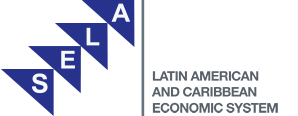BACKGROUND
The Meeting of International Cooperation Directors for Latin America and the Caribbean has been organized annually within the framework of SELA since 1987 as a meeting of cooperation directors and organizations of Latin American and Caribbean countries for the exchange of ideas, experiences and best practices regarding relevant issues on the agenda for cooperation and development assistance, from the Latin American and Caribbean perspective. In this connection, the annual meetings held recently have been focused on a central subject of great topicality and relevance to the region, among other aspects of interest for directors.
In this context, the Latin American Council of SELA has adopted two decisions to strengthen this space for encounter. Decision 156, of 1983, designated SELA as the "regional focal point for the exchange of information on Technical Cooperation among Developing Countries", and Decision 538, of 2012, on the "Meetings of International Cooperation Directors for Latin America and the Caribbean ", further supported this meeting.
In 2016, the XXVII Meeting of International Cooperation Directors addressed the issue of “Cooperation in science, technology and innovation in Latin America and the Caribbean.” This event was held with the co-sponsorship of the Pérez-Guerrero Trust Fund (PGTF) of the Group of 77, as well as other bodies specialized in the subject. To that end, invitations were extended to the organizations involved in cooperation in science and technology in Latin America.
Science, technology and innovation have been a topic of great importance in Latin America and the Caribbean. Since the first half of the last century, regional efforts in the field have been focused on creating a critical mass of professional scientists and producing local scientific knowledge. This was complemented with initiatives to promote strategic sectors, design technology transfer programmes, improve access to infrastructure and promote higher value-added exports.
At present, the global economic outlook and the commitments assumed by the region within the framework of the 2030 Agenda for Sustainable Development make science, technology and innovation a topic of greater importance, since it promotes the formation of qualified human capital, the design of productive development policies and the strengthening of institutional capacities.
In addition, the establishment of criteria is required to reduce the separation between research and production and, in particular, to determine collaboration and knowledge transfer actions, so that science, technology and innovation become a development instrument for the region.
Technological innovation has been considered a subject of great importance on the agendas of Latin American and Caribbean countries. Through innovation, production processes of each country can achieve high levels of productivity and competitiveness. Therefore, expressions of interest in relation to this issue have been considered in policies of international cooperation institutions, as well as in initiatives implemented by different multilateral organizations in the region.
Proof of this is the inclusion of the topic in the Plan of Action of the Community of Latin American and Caribbean States (CELAC) in 2015; the South American Council of Science, Technology and Innovation, created in 2012 within the framework of UNASUR; and the Commission for the Scientific and Technological Development of Central America, Panama and the Dominican Republic (CTCAP), a specialized agency of the Central American Integration System (SICA). In addition, several meetings on the same topic have been organized on a regular basis by the Organization of American States (OAS) and the Economic Commission for Latin America and the Caribbean (ECLAC), among others.






